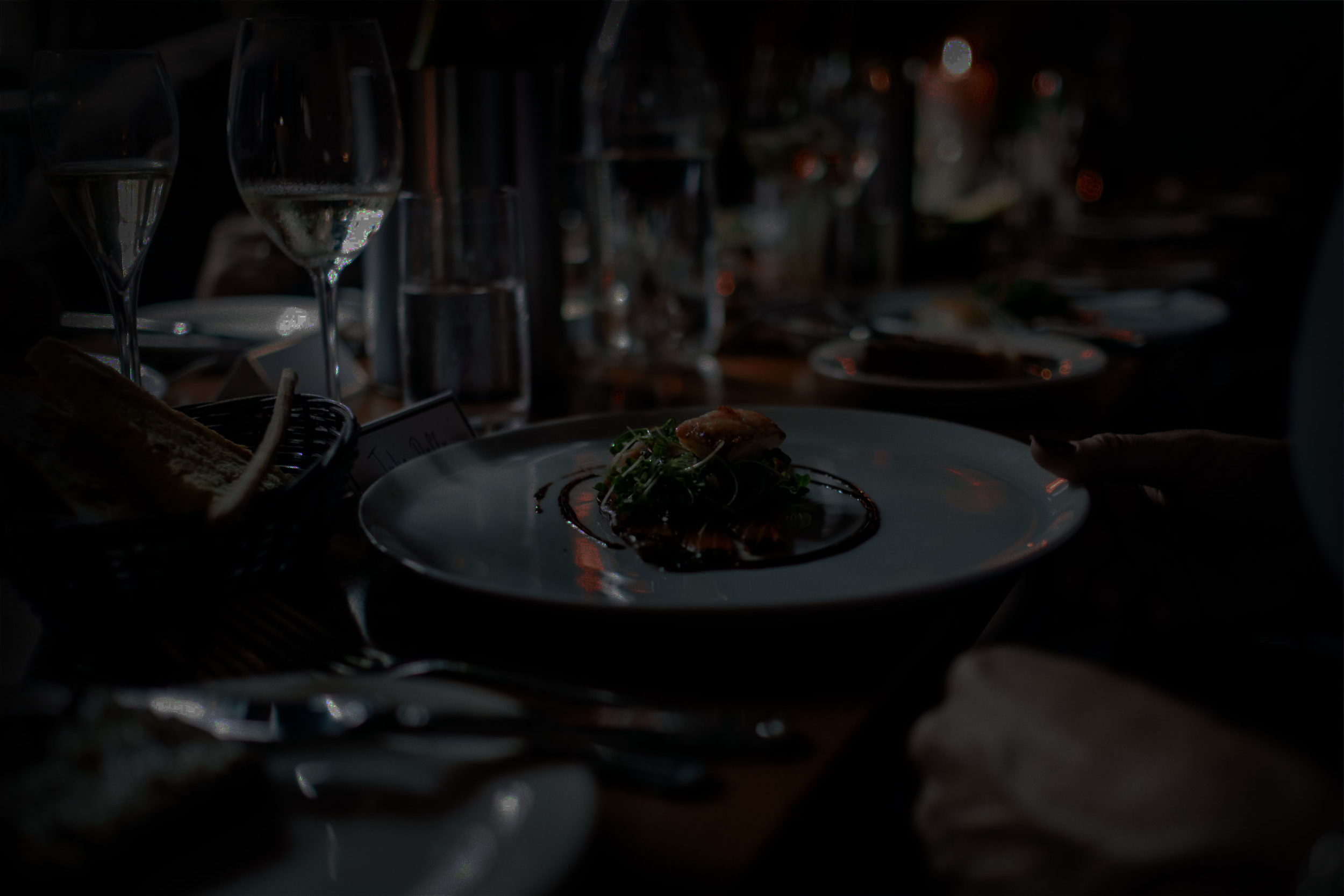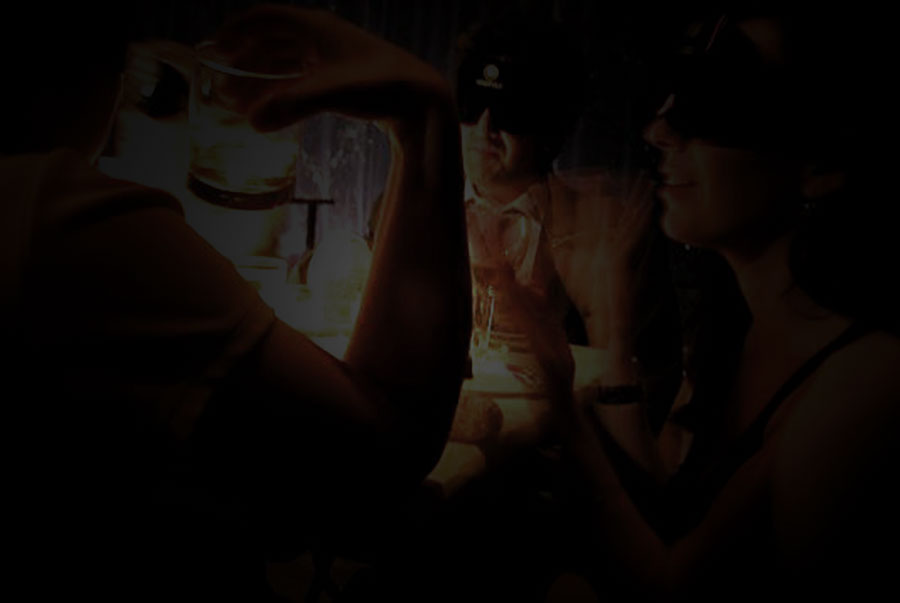Dark Dining
Stepping into V Lounge in Santa Monica feels like entering any other Westside club. A large, dimly-lit bar looms, surrounded by modern banquettes awash in purple, violet and aqua light meant for cosying up in to enjoy the evening’s libations. We take a seat and cocktails instantly materialise from the friendly service staff. It would almost be any other night out as usual, until the hostess brings us menus and asks us to please make our selections now… while we can still see.
Every Thursday through Saturday night, V Lounge transforms from a standard club into a completely revolutionary dining experience, hosting Opaque Dining in the Dark. A food trend that started in Europe in the likes of Berlin, Vienna and Paris, the concept is quite a simple one: what would it be like to eat in total darkness? The dark dining concept received a fresh perspective upon landing in the United States, where the Opaque team took the question one step further: what is dining like for those who have no eyesight? Hiring blind servers to guide patrons through the evening, Opaque attempts to give us a new understanding of visual impairment and those that it affects.
I analyse each gourmet dish for its potential hazards. How difficult will this be to eat blind?
As we peruse the menu, my thinking already begins shifting in response to this question. I analyse each gourmet dish for its potential hazards. How difficult will this be to eat blind? How challenging do I want to go? I decide to push myself and order the hot leek soup for my appetizer, knowing that the spoon-to-bowl-to-mouth repetition could very well end up in disaster. The next choices are easy: short ribs for the main course and warm chocolate lava cake for dessert, since both are sure to be textural sensations once sight has been removed from the equation.
At this point, we are introduced to our blind server, who will act as our host and guide for the rest of the evening once inside the pitch-black dining room. Our server is petite and cheery, with a wonderful sense of humour. She expertly guides our party into the dining room in a single-file line, each with our right hand on the right shoulder of the person in front of us. As we are guided to our chairs and take our seats, my mind tries to make sense of what is actually happening. We had been warned that it would be dark, but this was something else. Not one hint of light, not one reflection off a utensil. I hold my hand in front of my face and see nothing. This is, indeed, total and complete blackness. Opaque… the absence of light.
We had been warned that it would be dark, but this was something else. Not one hint of light, not one reflection off a utensil.
Sitting at the table, our server educates us on how to find our utensils, glasses and breadbasket using the clock system: drinks at two o’clock, bread at ten. I land my fingers in the butter dish as I reach for a piece of bread. My first (minor) casualty behind me, I attempt to eat and drink for the first time and find it easier than I had imagined. I discover with relief that my body knows what to do and takes over for me. As the first dish comes out and the soup is placed in front of me, my hand leads the way perfectly on its own, relying on the sound of the bowl and the feeling of it in front of me to guide each bite. Without vision, I realise that I actually taste each bite fully — the liquid feeling as the soup hits my mouth, the many layered flavours on the tongue, and the warmth of each spoonful going down. There is no denying that the loss of vision ignites and enlivens all of the other senses, bringing them fully to the forefront, when they are often otherwise forgotten by our outward focus. It is suddenly very clear to me why this has become a hot destination for a romantic rendezvous or a marriage proposal.

As our server brings the courses through, she stops to chat with us for a bit, sharing her story with us. She explains that she lost her sight degeneratively during her twenties as a young single mother, and walks us through how she learned to adapt to the loss of vision. Listening to her, I cannot help but feel her remarkable strength of spirit and notice her appreciation for all of the blessings in her life, in spite of her setbacks. She tells us that Opaque hires and trains servers who were born blind or became blind over the course of their lives and that they contribute to research and support for the visually impaired. They have several restaurants across the United States and even do private events for hundreds of people, with blind staff trained for large banquet dining. This provides their servers with new skills and the opportunity for a fresh start in which they are valued for their unique expertise.
Opaque delivers on their promise of giving us a new vision for what it is to live without sight from the moment we step into the darkened room — but what about the main course? I wonder to myself whether it will live up to the fine dining promise. With my first bite of short rib, the answer is a resounding “yes”. The chef creates complex complimentary flavours and textures, each ingredient picked purposefully. Crispy onions add the perfect crunch and burst of flavour on top of the richness of the short ribs and the creamy smoothness of the potatoes. Without my sight, I find myself experiencing a taste symphony — each note of flavour coming to the spotlight in its own perfect timing gives me a visceral experience of my meal that I have never had before and probably never will again.
Without vision, I realise that I actually taste each bite fully — the liquid feeling as the soup hits my mouth, the many layered flavours on the tongue, and the warmth of each spoonful going down.
As we continue on to our last course, I become aware of how normal it seems to be sitting here in the dark. My dinner companions and I chat easily, as if this is the most natural thing in the world to be doing. I find that my mind fills in the blanks: as I listen to my friends across the table, my mind creates their faces for me as if they could actually be seen. It is not until I stop myself and check in with the black void in front of me that I again recognise the extraordinary circumstance we find ourselves in.
After 2 hours in total darkness, it feels strange to come back into the visual world. Taking a few moments to readjust, I am struck with how this evening is a beautiful metaphor for life and its many changes. Our mind adapts and makes sense of each new situation, while our body takes over and leads the way, as long as we can learn to let go of that initial fear of the unknown and just trust in the void. Here at Opaque, I learn that it is much easier to do that surrounded by experts who can use their own unique experience to help lead the way.

